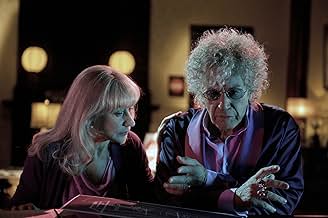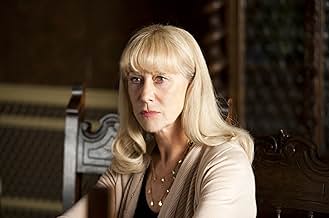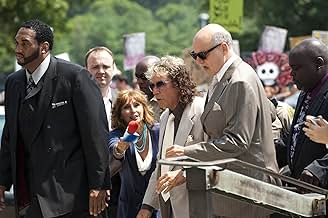IMDb RATING
6.2/10
8.3K
YOUR RATING
A drama centered on the relationship between Phil Spector and defense attorney Linda Kenney Baden while the music business legend was on trial for the murder of Lana Clarkson.A drama centered on the relationship between Phil Spector and defense attorney Linda Kenney Baden while the music business legend was on trial for the murder of Lana Clarkson.A drama centered on the relationship between Phil Spector and defense attorney Linda Kenney Baden while the music business legend was on trial for the murder of Lana Clarkson.
- Nominated for 11 Primetime Emmys
- 2 wins & 37 nominations total
Vernon Campbell
- Bodyguard
- (as Vernon W. Campbell)
Adargiza De Los Santos
- Focus Group Woman
- (as Adalgiza Chemountd)
Steve Park
- Focus Group Man
- (as Stephen Park)
- Director
- Writer
- All cast & crew
- Production, box office & more at IMDbPro
Featured reviews
There are those who believe this movie should never have been made. But it remains to be seen if it will ever be used to heal a very grave wound. The film is called " Phil Spector " and it stars one of the finest actors in Hollywood, namely Al Pacino. One can only wonder why he choose to do the movie as its only redeeming feature was, it did not serve to detract from Pacino's already remarkable career. On the other hand, his performance was such, it served to convince this audience member, that Spector was shown as a controlling, demented, self-serving neurotic, who isolated himself behind a wall of Megalomaniatic, delusions. The movie itself is a collage of half-baked memories which served only to convinced the audience that Spector had splinters in the Windmills of his mind. If director David Mamet had this in mind, he succeed. If his intention was to help his defense, he succeeded in doing the opposite. Except for the performances of his defense lawyers, Linda Kenny Baden (Helen Mirren) and Jeffrey Tambor who did their best to Spin the truth. The movie serves best when the audience is drawn only for the sheer entertainment. In this Mr. Pacino did his job only too well. ***
Based on actual events that took place, PHIL SPECTOR dramatizes the court-case in which the eponymous hero (Al Pacino) is accused of murder and defended by hotshot lawyer Linda (Helen Mirren). With David Mamet as writer/director, viewers can expect nothing less than a penetrating character-study with the emphasis on great dialog and changing reactions. PHIL SPECTOR does not disappoint in this respect; a study of a once-great music producer fallen on hard times who (like Norma Desmond in SUNSET BOULEVARD) lives in fantasy-worlds of his own creation. The ever-increasingly grotesque choice of wigs Spector uses is proof of this. Sometimes it's difficult to separate truth from fiction, while listening to his lengthy speeches - which makes the lawyer's task of defending him that much more difficult. In the end Spector's pretensions are unmasked as he is literally brow-beaten into making an appearance in court: Mamet's camera focuses unrelentingly on his hands that shake uncontrollably as he listens to the evidence presented against him.
As the lawyer, Mirren acts as a workmanlike foil to Pacino's central performance. Although firmly convinced of her client's innocence, she finds it increasingly difficult to present a convincing case; the judge and the prosecution seem hell-bent on frustrating her, as well as her client. Nonetheless she shows admirable stoicism in pursuing her case.
In the end, however, PHIL SPECTOR is not really a courtroom drama, even though much of the action is set in and around the court-house. Rather it concentrates on the double-edged nature of celebrity; when you're riding high, no one can touch you, but when you're down on your luck, everyone wants to kick you. This helps to explain Spector's retreat into a fantasy-world - at least no one can touch him there.
As the lawyer, Mirren acts as a workmanlike foil to Pacino's central performance. Although firmly convinced of her client's innocence, she finds it increasingly difficult to present a convincing case; the judge and the prosecution seem hell-bent on frustrating her, as well as her client. Nonetheless she shows admirable stoicism in pursuing her case.
In the end, however, PHIL SPECTOR is not really a courtroom drama, even though much of the action is set in and around the court-house. Rather it concentrates on the double-edged nature of celebrity; when you're riding high, no one can touch you, but when you're down on your luck, everyone wants to kick you. This helps to explain Spector's retreat into a fantasy-world - at least no one can touch him there.
"This is a work of fiction. It's not 'based on a true story.' It is a drama inspired by actual persons in a trial, but it is neither an attempt to depict the actual persons, nor to comment upon on the trial or its outcome." Above is the disclaimer that precedes David Mamet's Phil Spector. If I didn't know what to think of a biopic on the extreme eccentric character Spector was and remains, I really didn't know what to think after seeing that. This is a film that is just as enigmatic as its title figure, and earns its first strength by not judging, objectifying, or even shortchanging him despite his conviction. To make a biopic that lacks a viewpoint on its subject is a difficult, and often rare thing to do, yet the closer I look, the more I feel that Mamet made this film solely off of the fact that Spector is a compelling and unique figure.
For those unaware, Phil Spector was a renowned record producer in the sixties and seventies, known for helping The Ronettes, John Lennon, and The Ramones achieve untold heights with their music. Spector, himself, achieved notoriety in the public eye for being a true force of energy and uncompromising in his pursuit for greatness with his artists. In 2003, a woman named Lana Clarkson was found dead in his mansion from a gunshot wound through her mouth. Spector was quoted that night saying, "I think I killed somebody," and has had a known history with threatening violence to his girlfriends. But Spector's defense team has fought day-in and day-out to prove that it would be impossible for him to have committed the murder, due to the lack of evidence on crucial pieces (IE: lack of blood on his jacket).
Mamet decides to set his sights on the events preceding the first trial and the events of it, with Al Pacino assuming the role of Spector and Helen Mirren embodying Linda Kenney Baden, his attorney. The first act of the film focuses on the interworkings of Spector's defense team, where we see Baden and Bruce Cutler (Jeffrey Tambor) try to enact a plan for going about Spector's impending trial. Only until about twenty-minutes in do we see Spector, who is portrayed as a ruthless, foul-mouthed, arrogant, frustrated time-bomb on the verge of an implosion due to media scrutiny and constant false allegations. The film's most powerhouse scene comes when we first meet Spector, and him and Baden have a long, fifteen minute monologue together in Spector's luxurious mansion. During the course of it, the dialog is fast-paced, always engaging, and buoyed greatly by two terrific performers.
Pacino and Mirren unsurprisingly carry the film to heights it may not have seen had lesser performers been placed in their roles. Think of the drudgery that would've taken place had those two cinematic greats been swapped for second/third-rate performers in their first moderately big film. I'm already a tad shocked that Phil Spector has been sidelined to primetime programming on HBO, when it clearly has the names to make it to the theaters (besides Pacino, Mirren, and Mamet, director Barry Levinson is credited as producer). But I suppose the real question is, would this film have made it out of the theaters with its budget and then some? Is this a story that could be universally appealing? My answer is no, because Phil Spector is not a perfect film and is story could be viewed as mundane with the abundance of other courtroom dramas. The trouble the film runs into the most is its length; it feels like Mamet was given a specific runtime before he even started shooting the film and couldn't make it any longer or shorter than ninety-five minutes. For this reason, some scenes (take the courtroom ones) feel short and undercooked, and the ending wraps everything up untidily after the first trial, which was declared a mistrial. With the wealth of information on only Spector's case, but the possibilities that could've resulted because of Spector's true enigma and personality as a whole, a whole hour could've been attached on to the ending. It seems silly to hire big names like Pacino, Mirren, Tambor, and Mamet for an ambitious project, but only utilize them for ninety-five minutes entirely.
Even though the picture remains unbiased, it is a relatively unsurprising fact that both sides of the Spector case have been able to get fired up about some element in the film. Clarkson's family feels that she was portrayed in an overly dramatic, unstable manner, while Spector defenders say that the "time-bomb" personality Pacino generates on screen isn't accurate at all. The way I see it, you can judge Mamet on the way he portrays the characters here, but you can't say he takes sides here. Both sides seem to have truths to them, and neither of them are given cold hard facts.
Mamet conducts the picture fluently and interestingly, even offering something of a commentary on the current state of our legal system and how we may have a problem at judging personality over person or something along those lines. Pacino's embodiment of Spector is wholly memorable, Mirren provides the picture with true elegance, and the supporting performances are forbidden to tread the line of unimportance. It's just a shame the scope wasn't broader, and the story more inclusive.
NOTE: Phil Spector will be playing on HBO for the remainder of March and April.
Starring: Al Pacino, Helen Mirren, Jeffrey Tambor, and Matt Molloy. Directed by: David Mamet.
For those unaware, Phil Spector was a renowned record producer in the sixties and seventies, known for helping The Ronettes, John Lennon, and The Ramones achieve untold heights with their music. Spector, himself, achieved notoriety in the public eye for being a true force of energy and uncompromising in his pursuit for greatness with his artists. In 2003, a woman named Lana Clarkson was found dead in his mansion from a gunshot wound through her mouth. Spector was quoted that night saying, "I think I killed somebody," and has had a known history with threatening violence to his girlfriends. But Spector's defense team has fought day-in and day-out to prove that it would be impossible for him to have committed the murder, due to the lack of evidence on crucial pieces (IE: lack of blood on his jacket).
Mamet decides to set his sights on the events preceding the first trial and the events of it, with Al Pacino assuming the role of Spector and Helen Mirren embodying Linda Kenney Baden, his attorney. The first act of the film focuses on the interworkings of Spector's defense team, where we see Baden and Bruce Cutler (Jeffrey Tambor) try to enact a plan for going about Spector's impending trial. Only until about twenty-minutes in do we see Spector, who is portrayed as a ruthless, foul-mouthed, arrogant, frustrated time-bomb on the verge of an implosion due to media scrutiny and constant false allegations. The film's most powerhouse scene comes when we first meet Spector, and him and Baden have a long, fifteen minute monologue together in Spector's luxurious mansion. During the course of it, the dialog is fast-paced, always engaging, and buoyed greatly by two terrific performers.
Pacino and Mirren unsurprisingly carry the film to heights it may not have seen had lesser performers been placed in their roles. Think of the drudgery that would've taken place had those two cinematic greats been swapped for second/third-rate performers in their first moderately big film. I'm already a tad shocked that Phil Spector has been sidelined to primetime programming on HBO, when it clearly has the names to make it to the theaters (besides Pacino, Mirren, and Mamet, director Barry Levinson is credited as producer). But I suppose the real question is, would this film have made it out of the theaters with its budget and then some? Is this a story that could be universally appealing? My answer is no, because Phil Spector is not a perfect film and is story could be viewed as mundane with the abundance of other courtroom dramas. The trouble the film runs into the most is its length; it feels like Mamet was given a specific runtime before he even started shooting the film and couldn't make it any longer or shorter than ninety-five minutes. For this reason, some scenes (take the courtroom ones) feel short and undercooked, and the ending wraps everything up untidily after the first trial, which was declared a mistrial. With the wealth of information on only Spector's case, but the possibilities that could've resulted because of Spector's true enigma and personality as a whole, a whole hour could've been attached on to the ending. It seems silly to hire big names like Pacino, Mirren, Tambor, and Mamet for an ambitious project, but only utilize them for ninety-five minutes entirely.
Even though the picture remains unbiased, it is a relatively unsurprising fact that both sides of the Spector case have been able to get fired up about some element in the film. Clarkson's family feels that she was portrayed in an overly dramatic, unstable manner, while Spector defenders say that the "time-bomb" personality Pacino generates on screen isn't accurate at all. The way I see it, you can judge Mamet on the way he portrays the characters here, but you can't say he takes sides here. Both sides seem to have truths to them, and neither of them are given cold hard facts.
Mamet conducts the picture fluently and interestingly, even offering something of a commentary on the current state of our legal system and how we may have a problem at judging personality over person or something along those lines. Pacino's embodiment of Spector is wholly memorable, Mirren provides the picture with true elegance, and the supporting performances are forbidden to tread the line of unimportance. It's just a shame the scope wasn't broader, and the story more inclusive.
NOTE: Phil Spector will be playing on HBO for the remainder of March and April.
Starring: Al Pacino, Helen Mirren, Jeffrey Tambor, and Matt Molloy. Directed by: David Mamet.
Great talent. The best. Actors, writer, director. Awful result. The worst. Acting, writing, directing.
Even the best creative talent, even when already a mature artist, can deliver bad stuff. Happens. Happened.
Young screen writers are told to avoid, and how to avoid, "exposition." This TV movie was all exposition.
The lighting leaves most scenes murky, but murky does not substitute for mystery. Mystery, and suspense, ain't none.
It opens with an on-screen statement that, in effect, this is a free fictional invention based on the trial of Phil Spector. But closes with an on-screen statement that seems to be an actual summary of the trial outcome which is not in the film. Not sure if that's also a fictional element or reality.
Even the best creative talent, even when already a mature artist, can deliver bad stuff. Happens. Happened.
Young screen writers are told to avoid, and how to avoid, "exposition." This TV movie was all exposition.
The lighting leaves most scenes murky, but murky does not substitute for mystery. Mystery, and suspense, ain't none.
It opens with an on-screen statement that, in effect, this is a free fictional invention based on the trial of Phil Spector. But closes with an on-screen statement that seems to be an actual summary of the trial outcome which is not in the film. Not sure if that's also a fictional element or reality.
If you're thinking this film is about the trial of Phil Spector, it isn't. It does, however, contain a lot about preparing for the trial.
Helen Mirren is Linda Kenney Baden, who reluctantly takes on the murder case of Phil Spector, who is accused of killing Lana Clarkson in his home. Spector claims it was suicide.
Baden reluctantly finds herself believing him, as she performs a series of experiments that to her prove he could not have done it. Though trying to talk with Spector is very difficult, she also finds herself liking him.
This is a good character study, if a little on the slow side. It would have been dreadful without Mirren and Pacino, however. Pacino plays Spector as a pathetic has-been who brags about his past accomplishments as he sits isolated in his home,"The Castle." He loses his temper often and goes off on tangents. "Would I have lost everything for her?" he asks Mirren about Clarkson. Because of his crazy behavior and history with guns and women, Spector is in a lot of trouble.
The film brings us through the mock trial and Baden's attempts to have Spector take the stand to see if he can do it. It's a disaster. On the day of the trial, he shows up in a huge fright wig and looks terrifying. Baden has her work cut out for her.
Mirren is wonderful as a woman with a cold that turns into pneumonia who is nonetheless vigorous in her defense. The best scene is when she receives a suggestion from an associate. To illustrate a point, she shows a young attorney the yellow piece that used to go in the middle of a .45 record - he doesn't know what it is. She shows him a .45 record and he guesses, "something for the computer?" She turns to her associate and says, "None of these people are going to know what you're talking about." Mirren is masterful.
In the end, which is not part of the movie, the first trial was a mistrial, but Baden could not take part in the second trial and he was convicted.
This HBO movie is worth seeing for the performances. It is slow at times, but then again, it's not very long.
Helen Mirren is Linda Kenney Baden, who reluctantly takes on the murder case of Phil Spector, who is accused of killing Lana Clarkson in his home. Spector claims it was suicide.
Baden reluctantly finds herself believing him, as she performs a series of experiments that to her prove he could not have done it. Though trying to talk with Spector is very difficult, she also finds herself liking him.
This is a good character study, if a little on the slow side. It would have been dreadful without Mirren and Pacino, however. Pacino plays Spector as a pathetic has-been who brags about his past accomplishments as he sits isolated in his home,"The Castle." He loses his temper often and goes off on tangents. "Would I have lost everything for her?" he asks Mirren about Clarkson. Because of his crazy behavior and history with guns and women, Spector is in a lot of trouble.
The film brings us through the mock trial and Baden's attempts to have Spector take the stand to see if he can do it. It's a disaster. On the day of the trial, he shows up in a huge fright wig and looks terrifying. Baden has her work cut out for her.
Mirren is wonderful as a woman with a cold that turns into pneumonia who is nonetheless vigorous in her defense. The best scene is when she receives a suggestion from an associate. To illustrate a point, she shows a young attorney the yellow piece that used to go in the middle of a .45 record - he doesn't know what it is. She shows him a .45 record and he guesses, "something for the computer?" She turns to her associate and says, "None of these people are going to know what you're talking about." Mirren is masterful.
In the end, which is not part of the movie, the first trial was a mistrial, but Baden could not take part in the second trial and he was convicted.
This HBO movie is worth seeing for the performances. It is slow at times, but then again, it's not very long.
Did you know
- TriviaThis movie revolved around the murder of Lana Clarkson. Clarkson appeared in Scarface (1983) with Al Pacino, who played Phil Spector in this movie.
- GoofsIn one of the interviews with Phil Spector, he says "Sam Cooke, in bed with some girl, the husband comes home - bam bam bam!". In reality, Sam Cooke was killed by a manager at a motel to which he had brought a prostitute. Sam Cooke was using the toilet in his room when the prostitute ran off with all his clothes, presumably to rob him. Cooke went into frenzy and headed for the manager's office, wearing nothing but shoes and a jacket, to ask where the prostitute had gone. The manager perceived Cooke's aggressive manner as an attack and shot him in the stomach. Court ruled the case as "justifiable homicide" and the manager was freed of all charges.
- Quotes
Bruce Cutler: She shot herself.
Linda Kenney Baden: You bet she did!
Bruce Cutler: Why?
Linda Kenney Baden: Not our problem anymore.
- Crazy credits'This is a work of fiction. It's not "based on a true story." It is a drama inspired by actual persons in a trial, but it is neither an attempt to depict the actual persons, nor to comment upon the trial or its outcome.'
- ConnectionsFeatured in The 65th Primetime Emmy Awards (2013)
- SoundtracksUnchained Melody
Written by Alex North and Hy Zaret
Performed by The Righteous Brothers
Courtesy of Universal Records
Under license from Universal Music Enterprises
Details
- Runtime1 hour 32 minutes
- Color
- Sound mix
- Aspect ratio
- 1.78 : 1
Contribute to this page
Suggest an edit or add missing content






































